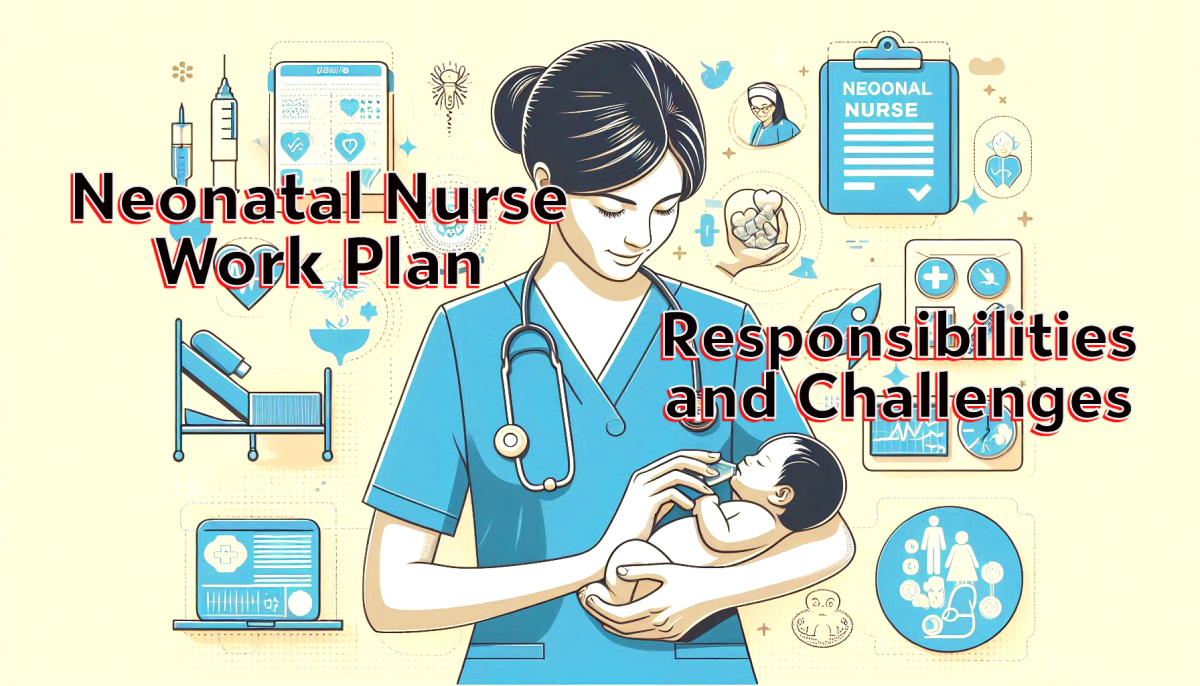Neonatal nurse are essential caregivers in neonatal intensive care units (NICUs) and newborn nurseries, working with newborns who need specialized care due to prematurity, low birth weight, birth defects, or other health issues.
Their work plan includes various responsibilities, from monitoring vital signs to providing emotional support to families. However, their job also comes with unique challenges, such as high-stress environments and complex medical conditions.
Responsibilities of a Neonatal Nurse
The nurses are responsible for a wide range of duties, most of which are centered on providing specialized care to newborns. Below are some of their key responsibilities:
1. Monitoring and Assessing Vital Signs
Monitoring the vital signs of newborns is a critical responsibility. Nicu nurse closely observe heart rate, respiration, blood pressure, and temperature, ensuring any abnormalities are identified and reported immediately.
2. Administering Medications and Treatments
In NICUs, nicu nurse are trained to administer medications, fluids, and even respiratory treatments. They also perform tasks such as inserting IV lines, giving injections, and managing feeding tubes.
3. Performing Specialized Procedures
Neonatal nurses are often involved in specialized procedures like intubation, drawing blood, and managing ventilators for infants with respiratory issues.
4. Educating and Supporting Families
Working with families is another vital responsibility. nicu nurse educate parents on newborn care, help them understand complex medical information, and provide emotional support during stressful times.
5. Collaborating with Medical Teams
Nicu nurses work closely with a team of healthcare professionals, including neonatologists, pediatricians, respiratory therapists, and other nurses. They share updates and work together to develop care plans for the babies.
Pediatric Nurse: A Vital Role in Children’s Healthcare
Challenges Faced by Neonatal Nurses
Despite the rewards, nicu nurse face several challenges that require resilience, compassion, and specialized training. Some common challenges include:
1. Emotional Stress of Neonatal Nurse
Working with critically ill infants can be emotionally challenging, as nicu nurse often witness fragile lives at risk and interact with anxious families. This stress can be difficult to manage, especially in cases where outcomes are uncertain.
2. High-Pressure Work Environment
The NICU is a high-stakes environment where emergencies are common, requiring nicu nurses to be quick-thinking and highly skilled in providing immediate care.
3. Complex Medical Conditions
Many infants in NICUs have complicated medical issues, such as congenital disorders or extreme prematurity, which require specialized care and knowledge.
4. Neonatal Nurse – Long Hours and Shift Work
Like many healthcare professionals, neonatal nurses often work long hours, including night shifts, which can lead to burnout. The demanding nature of the job requires them to stay alert and focused at all times.
5. Continuous Education and Skill Development for Neonatal Nurse
Neonatal care is a highly specialized field, with constant advancements in treatments and technologies. Nurses must continually update their skills and knowledge, often through additional training and certifications.
Work Plan for a Neonatal Nurse
| Responsibility | Description | Frequency |
|---|---|---|
| Monitoring Vital Signs | Regularly check and record infants’ heart rate, respiration, and temperature. | Every few hours or as needed |
| Administering Medications | Dispense medications and manage IV lines as prescribed. | Multiple times per shift |
| Performing Procedures | Insert IV lines, feeding tubes, and conduct blood draws as needed. | As necessary |
| Educating Families | Provide guidance on newborn care and explain medical procedures to parents. | Daily interactions |
| Documentation | Record all care given, medications administered, and observations in patient charts. | Every shift |
| Collaboration with Medical Team | Communicate with doctors and other healthcare providers to discuss infant care plans. | Throughout each shift |
| Emergency Response | Be prepared to act quickly in cases of emergency, such as respiratory distress. | As necessary |
Key Skills Required for Neonatal Nurses
To effectively manage these responsibilities, nicu nurses need a set of specialized skills, including:
- Attention to Detail: Precision is crucial when monitoring vital signs, administering medications, and recording information.
- Compassion and Empathy: Working with infants and families during stressful times requires emotional sensitivity.
- Communication: Explaining complex medical information in a clear and reassuring way is essential when working with parents.
- Adaptability: nicu nurses must remain flexible and calm in high-pressure situations, as emergencies can arise at any time.
- Teamwork: Effective collaboration with other healthcare providers is crucial for comprehensive patient care.
FAQs for Aspiring Neonatal Nurses
Conclusion
Nicu nurses play a critical role in the healthcare system, caring for some of the most vulnerable patients. Their responsibilities are broad, from monitoring vital signs to providing family support, and they face unique challenges, such as emotional stress and a high-stakes work environment.
Aspiring nicu nurses should be prepared to pursue specialized training and certifications to succeed in this rewarding field.




